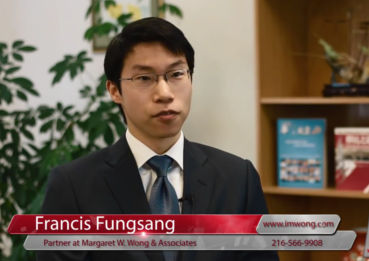Law Firm Overview - Scott Eric Bratton | Ohio Immigration
Scott Eric Bratton
At Margaret Wong & Associates we represent a number of high profile clients throughout the years. One of the high profile clients we recently represented was Obama Onyango who is the President of the United States, Barrack Obama’s uncle. In that particular case, he came to our office several a years ago – after he was arrested on a criminal charge – and he came to find out that he had a final deportation order from many years ago. We were successful in obtaining a stay of his deportation, as well as getting his case reopened, and getting him a new hearing with the immigration judge in Boston, Massachusetts. His final deportation hearing was last December, in December of 2013. And we were successful in obtaining Mr. Onyango’s lawful permanent resident status. It was a process that took him about 25 years from start to finish, but we were able to successfully obtain his green card through the immigration judge in Boston. And he’s now a lawful permanent resident of the United States.
We also handle district court litigation including challenges of denials from the United States Citizenship and Immigration Services, denials of any benefits such as adjustment of status, or Visa applications, or even employment authorization.
At our firm we’re happy to assist you in challenging your case either with the immigration judge in a removal proceeding or challenging it all the way up to the circuit court by means of a federal appeal, or an action in a district court. We also handle cases in district court dealing with detention of individuals who are detained during immigration proceedings or even subsequent immigration proceedings. In those cases we fight for the release of our clients, and have been very successful in the past in getting our clients out of jail so that they can resume their lives in the United States. If you have any questions about what I do, please contact Margaret Wong & Associates.
By: Scott Bratton
At Margaret Wong & Associates we represent a number of high profile clients throughout the years. One of the high profile clients we recently represented was Obama Onyango who is the President of the United States, Barrack Obama’s uncle. In that particular case, he came to our office several a years ago – after he was arrested on a criminal charge – and he came to find out that he had a final deportation order from many years ago. We were successful in obtaining a stay of his deportation, as well as getting his case reopened, and getting him a new hearing with the immigration judge in Boston, Massachusetts. His final deportation hearing was last December, in December of 2013. And we were successful in obtaining Mr. Onyango’s lawful permanent resident status. It was a process that took him about 25 years from start to finish, but we were able to successfully obtain his green card through the immigration judge in Boston. And he’s now a lawful permanent resident of the United States.
We also handle district court litigation including challenges of denials from the United States Citizenship and Immigration Services, denials of any benefits such as adjustment of status, or Visa applications, or even employment authorization.
At our firm we’re happy to assist you in challenging your case either with the immigration judge in a removal proceeding or challenging it all the way up to the circuit court by means of a federal appeal, or an action in a district court. We also handle cases in district court dealing with detention of individuals who are detained during immigration proceedings or even subsequent immigration proceedings. In those cases we fight for the release of our clients, and have been very successful in the past in getting our clients out of jail so that they can resume their lives in the United States. If you have any questions about what I do, please contact Margaret Wong & Associates.
By: Scott Bratton





